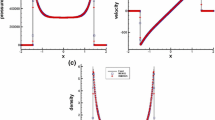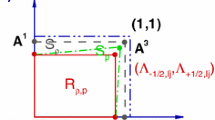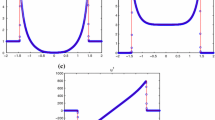Abstract
This paper presents the positivity analysis of the explicit and implicit Lax–Friedrichs (LxF) schemes for the compressible Euler equations. The theoretical proof is closely based on the decomposition of fluid variables and their corresponding fluxes into the pseudo-particles representation. For both explicit and implicit 1st-order LxF schemes, from any initial realizable state the density and the internal energy could keep non-negative values under the CFL condition with Courant number 1.
Similar content being viewed by others
REFERENCES
Chalabi, A. (1997). On convergence of numerical schemes for hyperbolic conservation laws with stiff source terms. Math. Comp. 66, 527–545.
Einfeldt, B., Munz, C. D., Roe, P. L., and Sjogreen, B. (1991). On Godunov-type methods near low densities. J. Comput. Phys. 93, 273–295.
Godunov, S. K. (1959). A difference scheme for numerical computation of discontinuous solutions of hydrodynamics equations. Mat. Sb. 47, 271–306.
Gressier, J., Villedieu, P., and Moschetta, J. M. (1999). Positivity of flux vector splitting schemes. J. Comput. Phys. 155, 199–220.
Harten, A., Lax, P. D., and van Leer, B. (1983). On upstream differencing and Godunov-type schemes for hyperbolic conservation laws. SIAM Rev. 25, 35–61.
Linde, T., and Roe, P. L. (1996). On multidimensional positively conservative high-resolution schemes. In Barriers and Challenges in Computational Fluid Dynamics, Hampton, Virginia, pp. 299–313.
Perthame, B., and Shu, C. W. (1996). On positivity preserving finite volume schemes for Euler equations. Numer. Math. 73, 119–130.
Roe, P. L. (1981). Approximate Riemann solvers, parameters vectors, and difference schemes. J. Comput. Phys. 43, 357–372.
Sanders, R., and Prendergast, K. (1974). The possible relation of the three-kiloparsec arm to explosions in the galactic nucleus. Astrophysical J. 188, 489–500.
Shu, C.-W. (1999). High order ENO and WENO schemes for computational fluid dynamics. In High-Order Methods for Computation Physics, Barth, T. J., and Deconinck, H. (eds.), Lecture Notes in Computational Science and Engineering, Springer, Vol. 9, pp. 439–582.
Tang, T., and Xu, K. (1999). Gas-kinetic schemes for the compressible Euler equations: Positivity-preserving analysis. Z. angew. Math. Phys. 50, 258–281.
Author information
Authors and Affiliations
Rights and permissions
About this article
Cite this article
Tang, HZ., Xu, K. Positivity-Preserving Analysis of Explicit and Implicit Lax–Friedrichs Schemes for Compressible Euler Equations. Journal of Scientific Computing 15, 19–28 (2000). https://doi.org/10.1023/A:1007593601466
Issue Date:
DOI: https://doi.org/10.1023/A:1007593601466




